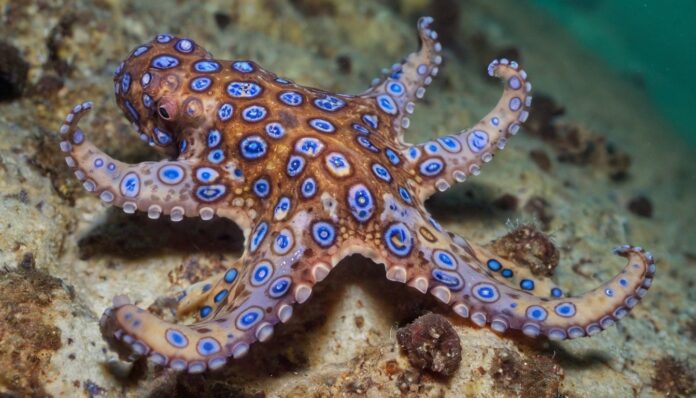The blue-ringed octopus is a fascinating and dangerous creature that lives in the ocean. Despite its small size, it is one of the most poisonous animals in the world. Let’s learn more about this remarkable octopus.
Habitat
The blue-ringed octopus is found in the shallow waters of the Pacific and Indian Oceans. They are especially common around Australia and Japan. These octopuses like to hide in crevices, coral reefs, and tide pools.
Physical Characteristics
The blue-ringed octopus is small, usually only about 12 to 20 centimeters long. Its most distinctive feature is the bright blue rings that cover its body. These rings become even more vibrant when the octopus feels threatened, serving as a warning to potential predators.
Diet
Blue-ringed octopuses feed on small crustaceans like crabs and shrimp. They also eat small fish. They use their venom to paralyze their prey, making it easier to eat.
Poison
The venom of the blue-ringed octopus contains tetrodotoxin, a powerful neurotoxin. This toxin can cause muscle paralysis and respiratory failure. There is no known antidote for the venom, making it extremely dangerous.
Danger to Humans
Although small, the blue-ringed octopus can be deadly to humans. A bite from this octopus can be fatal within minutes if not treated promptly. The bite is often painless, so people may not realize they have been bitten until symptoms appear.
Interesting Facts
- Blue-ringed octopuses can change color to blend in with their surroundings.
- They have a short lifespan of about 1.5 to 2 years.
- Their venom is 1,000 times more powerful than cyanide.
- They are part of the Cephalopoda class, which also includes squids and cuttlefish.
- Despite their deadly venom, they are not aggressive towards humans unless provoked.
The blue-ringed octopus is a small but incredibly dangerous sea creature. With its striking blue rings and potent venom, it commands respect in the ocean. Understanding and respecting this remarkable octopus can help us appreciate the diversity and complexity of marine life.
